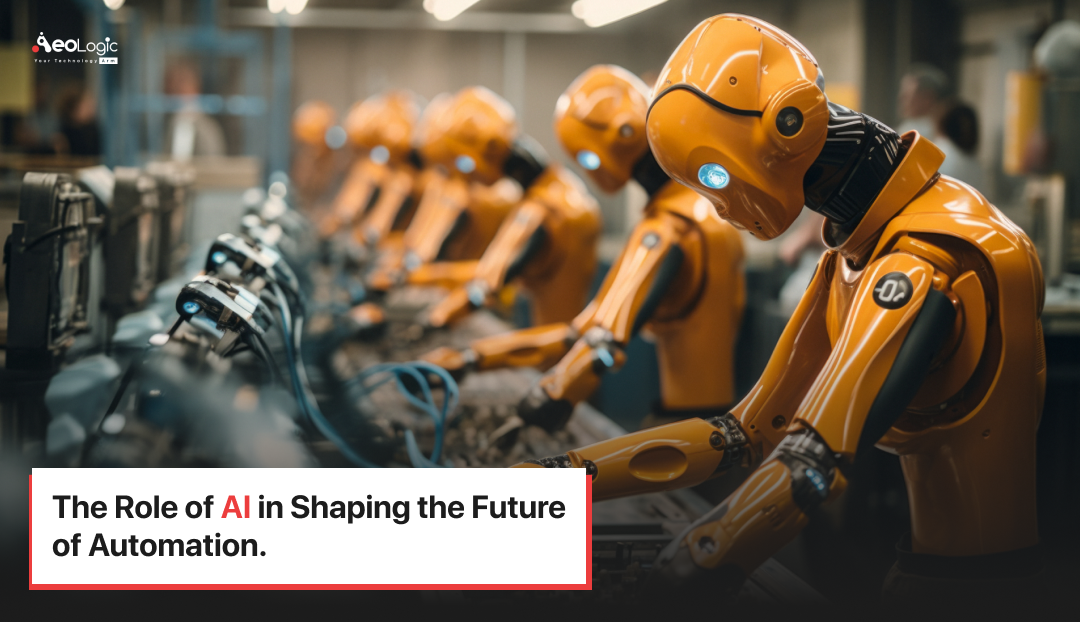Since the dawn of time, countless technologies and innovative solutions have been developed, shaping the world as we know it. Among all technologies, surely artificial intelligence is sitting on top of the table, as this technology possesses immense potential and abilities to enhance task efficiency with its various use cases. If we talk about the impact on the global market, the market size in the artificial intelligence market is projected to reach US$243.70bn in 2025. The market size is expected to show an annual growth rate (CAGR 2025-2030) of 27.67%, resulting in a market volume of US$826.70bn by 2030.
Among all the use cases and benefits, automation solutions stand out as a key aspect significantly enhanced by the implementation of AI. The present and future of automation also seem secure with artificial intelligence. If we talk about the automation market, the global automation market is expected to reach between $205.11 billion and $265 billion in 2025. On the other hand, the global industrial automation market size is projected to grow from USD 169.82 billion in 2024 to over USD 443.54 billion by 2035, representing a CAGR of 9.12%during the forecast period 2024-2035.
Role of AI in Automation Solutions
Artificial intelligence can be used to establish automation in various business operations that can increase operational efficiency. There could be multiple use cases of AI for enhancing the future of automation like automating repetitive tasks. AI-powered automated robots that do tasks on their own, autonomous decision-making, and autonomous vehicles, are examples of these. All use cases or benefits of AI together are shaping the present and future of automation. If we talk about this year’s expected market size of AI-powered automation, the global market for AI-powered automation is expected to grow to between $200 billion and $300 billion by 2025.
We have covered the introduction and learned some key facts and stats. Next, we will explore the benefits and challenges of using AI for automation. Finally, we’ll share a short and clear conclusion.
Also Read: How AI Solutions Help Mitigate Risks in Business Operations
Overview: AI in Automation
The future of automation is being shaped by artificial intelligence (AI), which makes it possible for machines to carry out jobs that were previously completed by humans. AI can increase accuracy, automate tedious operations, and free up human labor for more strategic endeavors.
By offering practical insights and suggestions, AI can help managers by expediting the decision-making process. There are many other benefits that we will see later in the upcoming paragraph.
Also Read: How Generative AI is Revolutionizing Industries in 2025
Benefits of AI In Shaping The Future of Automation
Here are some key benefits of AI in shaping the future of automation. We have a few mentioned below.
AI-powered automated robots
Robots are one of the great use cases of automation that can be enhanced in the future with the integration of artificial intelligence. With AI-powered automation, robots can analyze a lot of data themselves and then complete the task as scheduled in the system. This enhances work efficiency, reduces human labor, and also provides more time to focus on complex tasks. So robots will surely be one of the most famous use cases in the upcoming future.
Risk mitigation
There are many industries, like chemical, manufacturing, and logistics, that involve various operations and machinery. There is always a high chance of risk to human lives that need to be mitigated. AI can establish automation in those industries by creating an automated system to warn about any risk factor. Artificial intelligence algorithms can analyze every operation and can detect any unusual activity in patterns.
Creating a smart system
AI can also contribute to creating a smart automated system with the help of other technology. IoT is one of the major parts of smart systems that gather data or information. With the implementation of AI, it is possible to establish automated communication among various IoT devices that also help to make automatic decisions. For example, AI can automate the traffic flow and sensors as to when to stop and when to move the vehicles by analyzing data gathered by IoT-powered devices like cameras or sensors.
Self-learning system
Automation can be implemented among various industries,, but it is quite difficult to make changes with the upgradation of systems. Where AI implementation for automation can change the perspective. The AI algorithm has the capability of self-learning that allows it to make changes and upgrades automatically without the need for any human expertise. This could be an innovation to shape the future of automation with AI.
Autonomous vehicles
Road accidents are one of the major issues in this world that are changing with automatic-driven vehicles. Since only automation cannot help to expand autonomous vehicles to their full potential when AI can shape the future in a better way. AI can automatically analyze traffic patterns, enable predictive maintenance for engines, and respond calmly in emergencies, ensuring efficiency and reliability.
Overcoming AI Challenges in Shaping the Future of Automation
So we have seen some key benefits; now it’s time to go through some challenges too. Here are a few key challenges mentioned below.
- Poor data quality can interrupt the benefits of AI for enhancing the future of automation, as it can result in wrong decision-making.
- AI-powered automation may not be fully compatible with government standards and rules, which can be a challenging thing too.
- Automation powered by AI can limit the thinking of humans, as it can manage tasks, processing of data, and decision-making.
Also Read: Why AI Solutions are Key to Driving Business Growth
Final Words
Artificial intelligence is definitely developed by humans, but it has the ability to think outside the box. Automation is another aspect of AI that is changing the world in a very fast and efficient manner. Nowadays automation is not fully implemented, but the future can be more powerful with the integration of AI.
There can be various benefits, like automated decision-making, automated robot development, automatic predictive maintenance, risk mitigation detection, etc. On the other hand, there are cons too, such as integration complexity, job loss fear, cost, compatibility, security issues, etc., but after all evaluation, you will find AI an incredible tool for shaping the future of automation.
FAQs
How does AI improve the accuracy of automated systems?
AI greatly improves the precision of automated processes, as it can incorporate flexibility and intelligence into traditional rule-based elements.
Unlike typical automation, which simply adheres to rules or instructions, AI uses machine learning to process and analyze tremendous amounts of data, discern patterns, and make decisions.
- Predictive Analytics: AI algorithms can predict outcomes—which in manufacturing can prevent errors by as much as 30% in certain industries—for example, AI can predict upcoming equipment failures.
- Continuous Learning: Over time, systems learn to become more efficient and improve their precision in tasks like fraud detection or product quality control.
- Natural Language Processing: AI powered chatbots, for example, are able to understand complex customer inquiries and provide accurate and appropriate responses at an extremely high rate.
- Computer Vision: In context of automated inspections, AI can discern defects in products with greater accuracy than human inspectors.
AI can take in real time data and recalibrate accordingly based on new variables, reducing human error, creating optimized decisions, and consistent output.
Having the ability to adapt and re-calibrate is transformative and will be essential in any industries that require precision – health diagnostics or autonomous vehicles for example.
What challenges does AI face in automation?
While AI has clearly shown its value in automation, companies are still grappling with challenges that may prevent AI from entering their work environment or optimally functioning in the workplace. Here are some of these challenges:
- High costs associated with implementation: Investing in AI might require large sums of money for technology, infrastructure, and expertise. This investment is sometimes beyond the means of smaller organizations to consider.
- Data privacy & security: AI needs access to vast amounts of Big Data, which raises concerns around breaches and regulatory compliance such as GDPR.
- Ethical concerns: AI is inherently biased, and a machine learning algorithm once developed and in place might result in unfairness when used; e.g., consider biased discriminatory hiring tools. Ethical frameworks must be in place for AI operations.
- Skill gaps: The talent shortfall in AI specialist skill sets makes deployment and maintenance more difficult. An example of this can be illustrated by the findings from a survey conducted in 2023 which indicated 63% of interview participants indicated it was challenging to deploy AI-based automation due to a shortfall in skilled specialists.
- Implementation complexity: Deployment could require that significant engineering be completed the existing legacy infrastructure, add complexity to integration.
To address these challenges involve considerable strategic planning, transparency in understanding OPCO (operational control), and investing in employee training and development of an engaged workforce capable of making AI disruptions effective and responsible leveraging organization innovation balancing societal and technical boundaries.
How will AI automation impact small businesses?
AI automation offers significant advantages for small businesses by increasing their efficiency and access to technology to compete against bigger businesses in ways they never could before. The positive aspects of AI automation include:
- Cost Efficiency: Programs like AI accounting programs or AI inventory management systems offer cost savings for businesses, allowing cost effective automation for business processes that improve operational performance through repetitive task automation.
- Improved Customer Service: A business can have a AI Chatbot that can respond to customers at any hour of the day, emails respond much quicker than 4-5 hours by another person, and likely improved customer satisfaction without hiring another person.
- Improved Marketing: AI can analyze consumer behavior patterns that can help provide insights into consumer shopping habits which can improve marketing campaigns, thus hopefully increasing the conversion rate of organizations especially small businesses that have limited advertising budgets.
- Scalability: Artificial intelligent solutions that are cloud based- allow for advanced automation solutions that were not be accessed without significant investments into infrastructure.
There are some challenges to implementation which may include technical expertise, and initial integration costs. However, small companies can familiarize themselves with affordable and available AI tools in their field and the default benefit of reduced operational load/ improved operational performance. Early studies also demonstrated productivity innovation from small to small companies of 30% to 40% productivity gain.
The accessible nature of technology through democratization creates opportunity for small firms to innovate, expand and develop position against other businesses competing in market. It creates a level playing field.
How can businesses prepare for AI-driven automation?
In order to achieve AI-powered automation, businesses will need to take active measures to embrace this disruptive technology:
- Train for the Workforce: Organizations should invest in workforce training that specializes in AI literacy and data analysis, and build competencies to use AI applications, systems and activities.
- Implement Scalable Technologies: Start with newer cloud-based AI technologies to reduce large capital investment, and engagement with the technology vendors to adapt to changing needs along the way.
- Protect Data Security: Develop robust data and cybersecurity policies, practices and procedures to protect the sensitive data operated by AI, and enforce compliance with the regulatory authorities.
- Embrace Innovative practices: Engage employees in innovative practices through formal AI pilot testing programs to identify potential opportunities with many AI applications; e.g. process automations, predictive maintenance of equipment, or new customer engagement models.
- Engage Problem Solving Experts: Engage AI technology vendors and consulting community for support in identifying the right solutions and with the integration support with the content of the businesses.
Align short-term strategies and operational initiatives with the organization’s long-term goals to leverage AI to improve efficiency and to increase their competitive advantages. For example, organizations that have committed to early development of the platform, have enjoyed boastful revenue increases of 15-20%. Preparation of the organization will ensure ease of effort as they leverage AI technology for growth.

I’m Deepika Pandey, an SEO strategist and content writer with 6+ years of experience. I create SEO-friendly content that drives traffic and engages readers. I combine data insights with creativity to help businesses grow their online presence effectively.







